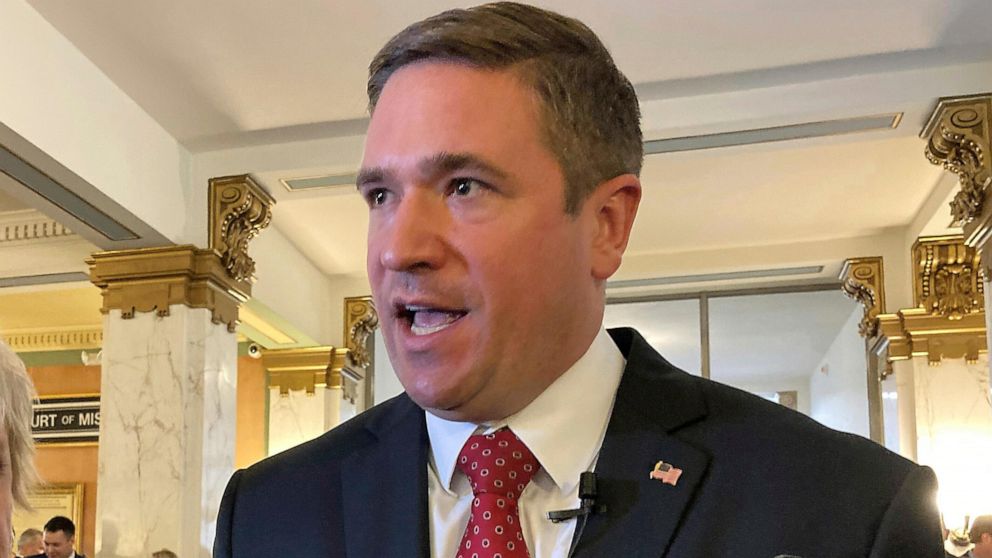ACLU sues to block new Missouri restrictions on adults and children seeking gender-affirming health care
JEFFERSON CITY, Mo. – The ACLU of Missouri filed a lawsuit Monday to block new state restrictions on adults and children seeking gender-affirming health care, which are set to go into effect Thursday .
Lawyers for the ACLU, Lambda Legal and Bryan Cave Leighton LLP representing transgender Missourians and health care providers have asked a St. Louis County judge to block the first rule from taking effect of the kind.
They argue that Republican Attorney General Andrew Bailey lacks the authority to use a state consumer protection law to regulate gender-affirming care through emergency rulemaking.
The rule is “a baseless and discriminatory attempt to limit health care options for transgender people, who already face several barriers to accessing necessary and life-saving medical care”, said Dr Samuel Tochtrop of the plaintiff Southampton Community Healthcare, in a statement.
Before gender-affirming medical treatments can be provided by physicians, the regulations require people to have experienced an “intense pattern” of documented gender dysphoria for three years and received at least 15 hourly sessions with a therapist for at least 18 months. Patients should also first be screened for autism and “social media addiction,” and any psychiatric symptoms related to mental health issues should be treated and resolved.
Some people will be allowed to maintain their prescriptions while they quickly receive the required assessments.
“Our regulations enact basic safeguards for procedures that an international medical consensus has deemed experimental,” Bailey said in a statement Monday. “Rather than ensuring that patients are protected by common sense safeguards, these organizations are rushing to court in an effort to continue their ideological procedures masquerading as medicine.”
Bailey marketed the restrictions as a way to protect minors from what he describes as experimental treatments when he announced his intention to create the rule in March. He also applied limits to adults in the final rule.
“We have serious concerns about the way children are being treated across the state. But we believe everyone has a right to evidence-based medicine and adequate mental health care,” Bailey spokeswoman Madeline Sieren said after the rule was filed on April 13.
The rule is an unusual step by Missouri’s attorney general, who has limited jurisdiction under state law. The office is responsible for upholding state laws, handling criminal appeals, and prosecuting financial crimes and consumer fraud.
The lawsuit alleges the rule “is an improper and extra-legislative overreach by an unelected political appointee” seeking to use state consumer protection law, which the plaintiffs describe as “an act intended making sure that cars are sold with titles and that hardware stores honor a warranty on a vacuum cleaner.
If the rule goes into effect, doctors who provide gender-affirming health care must first provide a long list of potential negative side effects and information warning against such treatments.
Healthcare providers will have to ensure that “all psychiatric symptoms of the patient’s existing mental health comorbidities have been treated and resolved” before providing gender-affirming treatments under the new rule. Doctors should also screen patients for social media addiction, autism, and signs of “social contagion in relation to the patient’s gender identity.”
The FDA approved puberty blockers 30 years ago to treat children with precocious puberty – a condition that causes sexual development to begin much earlier than usual. Sex hormones – synthetic forms of estrogen and testosterone – were approved decades ago to treat hormonal disorders or as birth control pills.
The FDA hasn’t approved drugs specifically to treat gender-skeptical young people. But they have been used for many years for this “off-label” purpose, a common and accepted practice for many medical conditions. Doctors who treat transgender patients say decades of use are proof that the treatments aren’t experimental.
Critics worry about kids changing their minds. Yet evidence suggests that detransition is not as common as opponents of transgender medical treatment for young people claim, although few studies exist and they have their weaknesses.
——-
Associated Press writer Heather Hollingsworth reported from Mission, Kansas.
